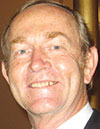
South Africa is recognised as one of the most advanced emerging markets in the world and a powerhouse in Africa. We should thus have a thriving economy as we are a country with huge potential and expertise. Our tertiary institutes produce world-class engineers and technicians who are leaders in engineering. We have the technical skills, the business skills, the manufacturing skills, yet as an industry we seem to be falling short.

Why are we falling short?
We are not falling short because we lack technical expertise or ambition to succeed. We are not falling short because entrepreneurial spirit or creativity is lacking. We are not falling short because there are not markets for South African products. We are falling short because government places so many obstacles and barriers in our paths. Energy constraints, rampant corruption, inflexible labour laws, crime; the list goes on and on of the many problems impeding economic growth in South Africa.
While other African countries are rolling out the red carpet to foreign investors, South Africa is rolling out the red tape. We as the electronics industry see our manufacturing capacity declining despite government’s localisation programmes. The good news is that the DTI is beginning to realise the importance of the electro-technical sector, and we have been invited to give inputs into the electro-technical sector’s profile. Inputs from our members will thus be welcomed.
Focus for 2020
As we go forward into 2020, the new committee of AREI (Association of Representatives for the Electronics Industry) has set itself three key areas of focus:
• Engaging more of our membership.
• Getting more done to benefit our industry.
• Closer collaboration with other industry players.
If we are focused on getting more done to benefit our industry, we need to start with getting to know our members better. We need to understand what you, our members, expect from the AREI committee and how we can add value to the electronics industry.
Market statistics are one area we have already made much progress; however we want to get a higher level of confidence in these statistics, and the easiest way of achieving this is by having more members submit their figures. The data is submitted by you to an independent organisation, Data Dynamics (in the UK), so total confidentiality is guaranteed.
Training is another important focus area we have identified. If our industry is to keep growing it is important that we ensure school leavers choose a career in electronics. I do believe that our universities and other tertiary institutes are doing an excellent job in training engineers and technicians. We can play a role participating in their open days, possibly even doing short presentations so students are more aware of us as an industry representative.
What lies ahead in 2020? Yes, there will be new challenges and problems, but there will also be new opportunities. We look forward to working with you and ensuring that our industry’s voice is heard. On behalf of the AREI committee, we want to express our appreciation for your support over 2019.

© Technews Publishing (Pty) Ltd | All Rights Reserved